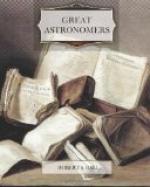The book, on its publication, was received and read with the greatest avidity. But presently the Master of The Sacred Palace found reason to regret that he had given his consent to its appearance. He accordingly issued a peremptory order to sequestrate every copy in Italy. This sudden change in the Papal attitude towards Galileo formed the subject of a strong remonstrance addressed to the Roman authorities by the Grand Duke of Tuscany. The Pope himself seemed to have become impressed all at once with the belief that the work contained matter of an heretical description. The general interpretation put upon the book seems to have shown the authorities that they had mistaken its true tendency, notwithstanding the fact that it had been examined again and again by theologians deputed for the duty. To the communication from the Grand Duke the Pope returned answer, that he had decided to submit the book to a congregation of “learned, grave, and saintly men,” who would weigh every word in it. The views of his Holiness personally on the subject were expressed in his belief that the Dialogue contained the most perverse matter that could come into a reader’s hands.
The Master of the Sacred Palace was greatly blamed by the authorities for having given his sanction to its issue. He pleaded that the book had not been printed in the precise terms of the original manuscript which had been submitted to him. It was also alleged that Galileo had not adhered to his promise of inserting properly the arguments which the Pope himself had given in support of the old and orthodox view. One of these had, no doubt, been introduced, but, so far from mending Galileo’s case, it had made matters really look worse for the poor philosopher. The Pope’s argument had been put into the mouth of one of the characters in the Dialogue named “Simplicio.” Galileo’s enemies maintained that by adopting such a method for the expression of his Holiness’s opinion, Galileo had intended to hold the Pope himself up to ridicule. Galileo’s friends maintained that nothing could have been farther from his intention. It seems, however, highly probable that the suspicions thus aroused had something to say to the sudden change of front on the part of the Papal authorities.
On 1st October, 1632, Galileo received an order to appear before the Inquisition at Rome on the grave charge of heresy. Galileo, of course, expressed his submission, but pleaded for a respite from compliance with the summons, on the ground of his advanced age and his failing health. The Pope was, however, inexorable; he said that he had warned Galileo of his danger while he was still his friend. The command could not be disobeyed. Galileo might perform the journey as slowly as he pleased, but it was imperatively necessary for him to set forth and at once.




